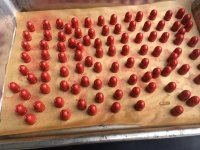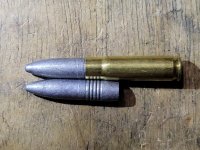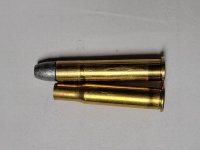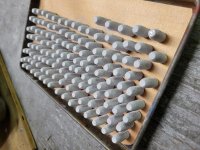I find the tension between some lubed vs coated shooters somewhat silly.
I've only loaded coated. The clean factor sent me in that direction, and I don't have the desire to exploit any potential 1/2" difference either way at 50 yards.
The guys that have developed good, lubed rounds and don't want to go through development again have a valid reason to stay the course.
Totally agree, everyone should use what's best for "their" shooting needs/standards.
Myself, I decided to get into coating bullets back in 2014. Already been using/making traditionally cast/lubed bullets for 3+ decades at that point in time. Cast bullets in a 308w was my interest & specifically coated bullets.
With a 1 in 14 twist 308w bbl most cast bullets held their own to the 2700fps+ threshold.
More often than not the traditionally cast/lubed bullets performed best in the 2400fpr to 2600fps range. The testing was over a 5 year period using 10+ different cast bullets and the same 14bhn alloy.
At the 50/60 round count accuracy started to go south with the traditionally cast/lubed bullets. Depended on the pressure of the load. Leading would start at the 25/35 round count.
The traditionally lubed bullets were lubed with lbt blue and a coat of tumble lube, ya double lubed. It took +/- 10 rounds to get a lube star on the muzzle of the 308w bbl.
At 2700fps+ the coated bullets started leaving burnt streaks in the bbl. They came out easy enough with bore tech eliminator.
The most coated bullet rounds I shot in 1 day was 300+ with all of them in the +/- 2700fps range while still maintaining accuracy. I never would have been able to do that with the traditionally cast/lubed bullets.
What the leade of that 308w bbl looked like when new.
What it looked like after 2000+ rounds of hot cast bullet loads.
Anyway I had all the traditionally cast/lubed bullets loads worked up/tested that I'd ever need with several different cast bullets for every firearm I owned. Just for the heck of it I decided to try coating some pistol/revolver bullets. It was a real eye opener.
Don't know why I find it surprising that the same posts keep coming up about accuracy/seating/etc.
Not as accurate:
I must be doing something wrong, not only do I find coated bullets just as accurate. I find its easier to find accurate loads with them.
Got to love the people that post I bought coated bullets that were similar in shape & weight to test against my home cast/lubed bullets and my findings were yada-yada-yada.
How about I bought bullets that were nothing like mine. The alloys they were made with is nothing like mine. The coated bullets I bought will act/perform nothing like mine.
Try doing head to head testing with your own cast bullets.
Have to seat deeper:
Myself, I always look at the leade of the throat of the chamber in a semi-automatic pistol. What the throating looks like tells me what bullet design to use for accuracy.
What most bbl's look like, Un throated. Most mfg's skip this step anymore and the result is the consumer ends up with a firearm that bbl is best designed for rn/ball ammo.
Same bbl that's been throated.
Everyone looks at this picture and sets their oal's up with their cast bullets so they head space on the bullet/best accuracy.
Myself, I never do that simply because I'm not a good enough reloader to make consistent ammo. Nor am I a good enough caster to make consistent bullets. My reloads very +/- 5/1000th's with their oal. So I set the oal for 10/1000th's less then the plunk test when doing the best accuracy with lead bullets thing. The end result is it doesn't matter if the same bullet is coated or traditionally lubed. They all load/shoot with acceptable accuracy.
Acceptable accuracy to me (I know it isn't 50yds) is all bullets touching @ 50ft. 3 different cast coated bullets for a $700 1911/45acp.
Same 4.3gr load of clays 3 different bullets 5-shot groups @ 50ft.
I use the same load/same oal/ same cast bullet with either traditional lube or coated.
At the end of the day there's some much parroting/mis information about coated bullets out there.






















